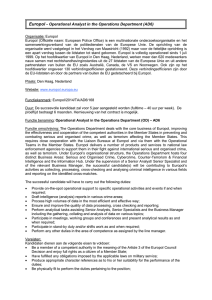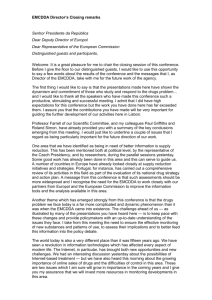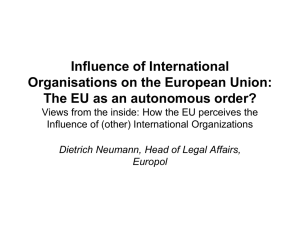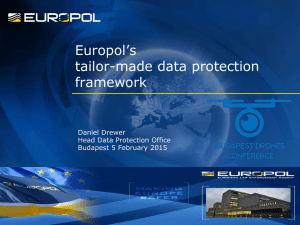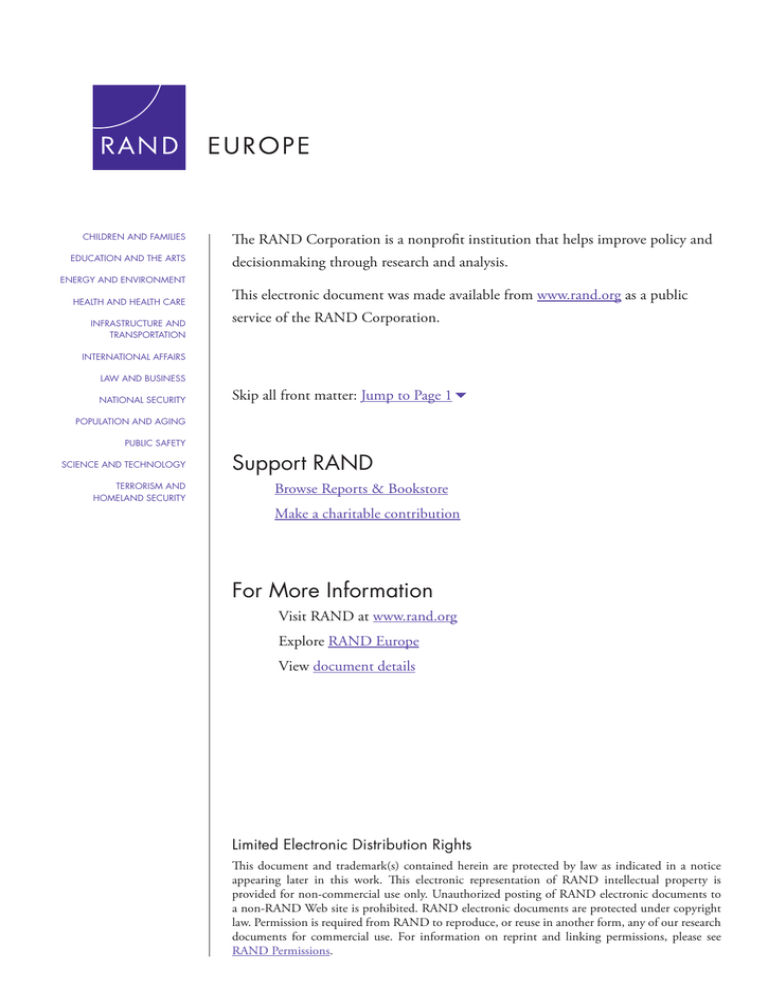
CHILDREN AND FAMILIES
EDUCATION AND THE ARTS
The RAND Corporation is a nonprofit institution that helps improve policy and
decisionmaking through research and analysis.
ENERGY AND ENVIRONMENT
HEALTH AND HEALTH CARE
INFRASTRUCTURE AND
TRANSPORTATION
This electronic document was made available from www.rand.org as a public
service of the RAND Corporation.
INTERNATIONAL AFFAIRS
LAW AND BUSINESS
NATIONAL SECURITY
Skip all front matter: Jump to Page 16
POPULATION AND AGING
PUBLIC SAFETY
SCIENCE AND TECHNOLOGY
TERRORISM AND
HOMELAND SECURITY
Support RAND
Browse Reports & Bookstore
Make a charitable contribution
For More Information
Visit RAND at www.rand.org
Explore RAND Europe
View document details
Limited Electronic Distribution Rights
This document and trademark(s) contained herein are protected by law as indicated in a notice
appearing later in this work. This electronic representation of RAND intellectual property is
provided for non-commercial use only. Unauthorized posting of RAND electronic documents to
a non-RAND Web site is prohibited. RAND electronic documents are protected under copyright
law. Permission is required from RAND to reproduce, or reuse in another form, any of our research
documents for commercial use. For information on reprint and linking permissions, please see
RAND Permissions.
This product is part of the RAND Corporation technical report series. Reports may
include research findings on a specific topic that is limited in scope; present discussions
of the methodology employed in research; provide literature reviews, survey instruments, modeling exercises, guidelines for practitioners and research professionals, and
supporting documentation; or deliver preliminary findings. All RAND reports undergo rigorous peer review to ensure that they meet high standards for research quality
and objectivity.
Evaluation of the
implementation of the
Europol Council Decision
and of Europol’s activities
Emma Disley, Barrie Irving, William Hughes,
Bhanu Patruni
Prepared for the Europol Management Board
EUROPE
The research described in this report was prepared for Europol Management Board.
RAND Europe is an independent, not-for-profit research organisation whose mission is
to improve policy and decision making for the public good. RAND’s publications do not
necessarily reflect the opinions of its research clients and sponsors.
R® is a registered trademark.
© Copyright 2012 Europol
All rights reserved. No part of this book may be reproduced in any form by any electronic
or mechanical means (including photocopying, recording, or information storage and
retrieval) without permission in writing from the copyright holder.
Published 2012 by the RAND Corporation
1776 Main Street, P.O. Box 2138, Santa Monica, CA 90407-2138
1200 South Hayes Street, Arlington, VA 22202-5050
4570 Fifth Avenue, Suite 600, Pittsburgh, PA 15213-2665
Westbrook Centre, Milton Road, Cambridge CB4 1YG, United Kingdom
RAND URL: http://www.rand.org
RAND Europe URL: http://www.rand.org/randeurope
To order RAND documents or to obtain additional information, contact
Distribution Services: Telephone: (310) 451-7002;
Fax: (310) 451-6915; Email: order@rand.org
Executive summary
Europol is the European Police Office – an international police organisation formed to
promote and strengthen cooperation among law enforcement agencies in the European
Union (EU). Europol’s mandate includes terrorism and serious and organised
transnational crimes affecting two or more Member States, including drug trafficking,
terrorism, illegal immigration, human trafficking, cybercrime, financial crime and
counterfeiting.
As a result of the Europol Council Decision (ECD), from 1 January 2010 Europol has
been transformed from an intergovernmental organisation, established by a Convention,1
to an EU entity funded from the general budget of the EU. Although the ECD is a fairly
recent instrument, Europol will be given a further new legal basis within the next two years
in a Europol Regulation.
This report sets out the findings from an evaluation of Europol. The objective of this
evaluation was to conduct an independent and external assessment of the way in which
Europol has implemented the ECD, and of the programmes and activities carried out by
Europol. In addition, the evaluation assesses the impact of the ECD and the legislative
framework on Europol’s performance, and identifies the strengths and weaknesses of the
ECD in order to inform decision making about the content of a future Europol
Regulation. The evaluation looked at 40 research questions, specified by the Europol
Management Board (MB). This short summary presents an overview of the evaluation and
its main findings and conclusions.
Data collection and approach to the evaluation
Four data collection activities were employed in this evaluation: a document review; focus
groups; interviews and a web-based survey. The research approach ensured that
information was gathered from a wide range of stakeholders, strengthening the balance and
breadth of perspectives, including stakeholders in Europol, other EU agencies, Member
States and third States.
The limitations of the research approach stem from the scarcity of data such as statistical,
financial and administrative reports, legal analysis and case histories which test, challenge
and validate the expert judgements and stakeholder opinions collected through focus
groups, interviews and the web-based survey. In most cases where validation was sought
1
Europol Convention O.J 1995, C 316/2
xv
Evaluation of the implementation of the ECD
RAND Europe
but not obtained, it appears that such information does not exist in a readily available form
and could not be generated within the scope of this research.
Another limitation stems from inviting evaluation participants to select which of the 40
questions to discuss or respond to in the time available. In part this provided an
opportunity for participants to select those questions on which they were most
knowledgeable. However, this approach also means that some questions were more
popular than others, and more data has been collected on some issues than on others.
The evaluation team has drawn conclusions and recommendations on the basis of the data
collected or otherwise available. Inevitably, therefore, some of the conclusions articulate the
need for further, in-depth investigation and other conclusions are tentative or include some
caveats.
The evaluation found very positive views among stakeholders: Europol is perceived to be
fulfilling its mandate.
Overall, the findings of this evaluation suggest that Europol’s stakeholders at Member
State and EU-level increasingly see Europol as operationally relevant. The question ‘To
what extent has Europol fulfilled its objective under the ECD … to enhance lawenforcement cooperation at EU level?’ received the most positive response among
respondents to the web-based survey administered as part of this evaluation, and there was
near unanimity among interviewees and focus group participants that the support provided
by Europol has added value to Member State law enforcement.
Europol’s network of liaison officers, the platforms that Europol provides for information
exchange with and between Member States, and Europol’s speciality criminal intelligence
analysis, are some of the services which are perceived to add value to Member States and
make the support offered by Europol unique. The ECD has not had a significant impact
on these factors or the day-to-day support that Europol provides to Member States.
Rather, the ECD grants Europol a new legal basis which can be amended more easily in
the future, without ratification by 27 Member States, in preparation for a Europol
Regulation.
Many of the issues raised in the evaluation demonstrate an underlying tension stemming
from the fundamental design principle of Europol.
The tension is between, on the one hand, the desire for Europol to be more operationally
supportive to Member States and improve its operational focus, but on the other hand, an
insistence on the primacy of Member States. As stated in the Treaty on Functioning of the
EU (TFEU), Europol’s raison d’être is to support Member States’ law enforcement
authorities and it has no coercive powers. Whether Europol is effective and has an impact
is determined largely by the policies and actions of Member States which provide Europol
with information and decide whether to use Europol’s outputs and expertise in domestic
law enforcement. Although some interviewees saw the advantages of a proactive Europol
with executive powers, the consensus was that the current design principles would be
maintained: Europol would not be granted executive powers and would continue to
operate through its relationships with Member States.
The gatekeepers to this relationship are the Europol National Units (ENUs). Given the
variation between ENUs in different Member States, this report recommends taking action
to increase homogeneity in the operation of ENUs through the possible inclusion in a
xvi
RAND Europe
Executive summary
future Regulation of a system for reviewing the activities of ENUs and arrangements for
identifying and sharing good practice in their regard.
The evaluation has identified a number of key issues for further, in-depth analysis.
As is expected from an evaluation which addressed such a large number of research
questions covering such a wide range of research topics, some of the conclusions and
recommendations call for further, in-depth analysis of issues which have been identified as
important, but where focused work is needed to arrive at a precise definition of the
problem or to understand practical and legal implications. For example:
evaluating whether and how the requirement contained in Article 8(4) of the
ECD (for Member States to share information with Europol) is implemented, and
therefore identifying opportunities for enforcing the Article 8(4) call for
information supply more effectively;
understanding the scope for further involvement by Europol in Joint Investigation
Teams (JITs);
collecting information about the impact of the Staff Regulations on Europol’s
operations; and
identifying any possible ways in which the current process of negotiating
operational agreements could be streamlined in preparation for a new Regulation.
Opportunities, risks and challenges for Europol.
This evaluation has taken place at a time of significant changes in the area of Justice and
Home Affairs (JHA), a number of which are described here:
Reform to the legal basis for the European Agency for the Management of
Operational Cooperation at the External Borders of the Member States of the
European Union (Frontex) has been recently completed and is now in the process
of implementation, and amendments to Eurojust’s legal basis and competency are
likely. Reforms to Frontex, Eurojust and Europol introduce risks of duplication,
overlap and lack of coordination. Cooperation between the European External
Action Service (EEAS) and Europol is at an early stage of development, but there
are many opportunities for future partnership.
Supervision of JHA agencies is increasingly under discussion and the role of the
European Parliament in this respect is likely to be developed in the coming years.
Many benefits could flow from parliamentary supervision, but at the same time
there are concerns about the supervision of operational matters.
The climate of austerity means restrictions on Europol’s budget and the possibility
of severe cuts to the budgets of national law enforcement agencies. However, at
the same time Member States’ demands for support from Europol are growing,
and Europol’s status as an entity of the EU has led to increased requests for
analysis and other forms of support from the European Commission and Council
working groups.
xvii
Evaluation of the implementation of the ECD
RAND Europe
Given this environment, some of the conclusions of this evaluation relate to the way in
which Europol monitors its environment in order to have the best possible information
about the risks, opportunities and demands coming its way. For example:
Europol should continue to monitor closely the demands placed upon it by EU
and Member State stakeholders;
the risk of overlap, duplication and even contradiction with other JHA agencies
should be monitored, as should proposed changes to other agencies;
consideration should be given to developing a strategy which anticipates future
changes to how Europol is held to account, and in particular, possible changes to
the role of the European Parliament.
The evaluation draws up a short list of possible changes to Europol’s legal basis to
facilitate information sharing and improved data management.
While the evaluation does not support the proposition, advocated by some participants in
the research, of imposing information-sharing obligations on Member States, some
changes are recommended. These are listed briefly below, with important limitations and
caveats explained elsewhere in the report.
Consideration should be given to removing statutory definitions of separate data
processing systems in a future Europol Regulation, in order to introduce flexibility
regarding the design of processing environments.
Consideration should be given to amending the provisions in Article 25(4) of the
ECD to possibly allow Europol to share personal data gathered from publicly
available sources with third parties where there is no operational agreement,
provided that certain safeguards and conditions are met.
Consideration should be given to amending Article 10(3) of the ECD in order to
allow new systems for processing personal data to include sensitive, personal data,
with the necessary data protection safeguards.
Consideration should be given to the possibility of permitting direct information
exchange with private entities in some prescribed circumstances.
Of all the evaluation questions, issues regarding Staff Regulations at Europol received the
most negative response.
There was a strong consensus that the EU Staff Regulations are not fit for purpose and that
they impede the ability of Europol staff to support 24/7 operational policing in Member
States. As well as a need for better quantification of the impact of the Staff Regulations, the
following recommendations were made by the evaluation team relating to staffing at
Europol.
Europol should consider whether it is making best use of law enforcement officials
who have worked in Europol and have now returned to their Member States –
such individuals could play a role in awareness-raising.
An analysis of the incompatibilities in career progression structures between
Europol and national law enforcement authorities should be conducted to allow
xviii
RAND Europe
Executive summary
Europol to work with Member States to ensure that there are incentives for the
most highly skilled law enforcement officers to spend time at Europol.
The evaluation identifies some areas in which Europol’s competency could be expanded.
The evaluation expresses caution regarding potential extensions of Europol’s mandate.
Article 88 TFEU states that Europol should support Member States, and the principle of
subsidiarity is important in evaluating potential changes to Europol’s mandate. Further,
there is a risk that any evidence collected by Europol would not comply with Member
State-level procedural rules governing the admissibility of evidence, which would diminish
the value of such information for operational law enforcement within Member States.
With these caveats in mind, the report includes the following two recommendations:
the future Europol Regulation should provide greater powers for Europol to
support investigations and operational activities, possibly with a capability to
provide funding;
the decision to host the European Cyber Crime Centre (EC3) at Europol will
create new demands upon the organisation. The European Commission should
evaluate whether Europol’s current legal framework enables an EC3 to fulfil its
objectives and carry out planned activities.
More information about each of these recommendations and conclusions can be found in
the report summary, and in each of the substantive sections of the report.
The evaluation has focused on the implementation of the ECD and the activities carried
out by Europol. It has engaged with a range of stakeholders in relation to topics spanning
Europol’s function, legal basis and activities. This report is complemented by recent
debates in the Standing Committee on Operational Cooperation on Internal Security
(COSI) on the future requirements of Europol in the context of the European Internal
Security Strategy. These debates seek to develop a ‘visionary approach on Europol’s future
role and tasks’. Many of the issues identified and explored in this evaluation are articulated
in those debates.
xix

